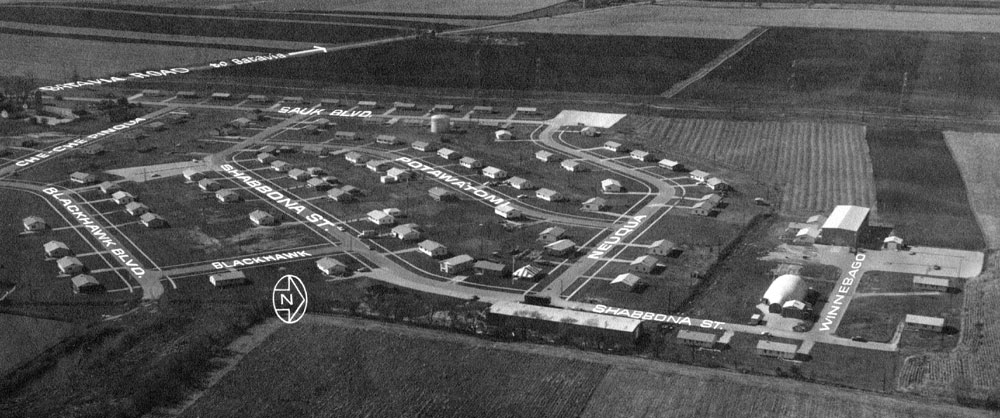Indian History Preserved in Village Streets

National Accelerator Laboratory Village, 1968
The street names in the Fermilab Village come from the pages of Illinois history, reminders of the years of settlement of midwestern United States. When the first white settlers came to northeastern Illinois, they found it inhabited largely by the Potawatomi Indians, with possibly a few small bands of the Illinois and Ottawa tribes scattered about the region. In the northwestern part of the State were Winnebagoes and the united Sauk and Fox tribes.
In 1804 the Sauk and Fox tribes signed a treaty which ceded 15 million acres of land in Wisconsin and Illinois to the U.S. government. A faction led by Chief Black Hawk opposed the treaty. The Indians claimed that white squatters were violating the terms of the treaty and in 1832 the Black Hawk War broke out over these violations. Black Hawk's forces were defeated and the Indians were forced westward across the Mississippi River.
In another effort to open up settlement, the U.S. government held a great council with Chippewas, Ottawas and Potawatomi tribes in Chicago in 1833. As a result, five million acres of Illinois land was traded for an equal amount of land beyond the Mississippi.
In the summer of 1835, the Indians still remaining in Illinois staged a magnificent war dance in Chicago, before taking leave of their land.
Fermilab's glossary of Indian history includes:
-
Blackhawk - A Sauk brave (1767-1838). In 1832 he led part of his tribe back to Illinois, precipitating the Black Hawk War. A statue of him stands on the east side of the Rock River, near Oregon, Illinois.
-
Che-Che-Pinqua - The name is the same as one of the Cook County Forest Preserves, also called Robinson's Woods. The land was once part of the property of Alexander Robinson, a Potawatomi chief whom the Indians named Che-Che-Pinqua , meaning "Blinking Eyes" or "Squint Eyes."
-
Neuqua (pronounced Neekwa) - The son of Waubonsie (a Potawatomi chief). Lived on a reservation about five miles south of Batavia in the 1830's.
-
Potawatomi - An Indian tribe which inhabited northern Illinois until 1835. The name means "people of the place of the fire, " or "makers, or keepers of the fire."
-
Sauk - An Indian tribe whose capital was near Rock Island. The name means "yellow earth" people, from their creation myth describing the clay from which the great spirit made them. This tribe was associated with the Fox Indians.
-
Shabbona - A Potawatomi chief, friend of white settlers. Lived in what is now DeKalb County.
-
Winnebago - A Siouan tribe with lands next to (north of) the Sauk and Potawatomi.


